The Ledger




Liberty High School 2275 Sommers Road Lake Saint Louis, MO. 63367 636.561.0075 ext: 28039 jonathanhall@wsdr4.org

Gavin Block* Kay Copeland*

Elaine Thimyan (Layout Editor), Bryleigh Conley, Cade Goins, Taylor Koehnemann, Abbiegail Luker, Connor Smith and Chloe Stenger *Eacheditoralsoservesasareporter
The Ledger is a publication that releases 4 issues (one issue per quarter) throughout the year, distributing 1,000 free copies to the student body, faculty and administration. The Ledger magazine is a part of the district’s curriculum and is designed to provide a practical journalistic experience for written expression on a variety of topics. It is a student-led publication class that reports on stories
relatable to the school community. Students write, take photos, and design the publication while the adviser supervises the student journalists. The opinions expressed in this magazine may not be those of Liberty High School, nor of the Wentzville R-IV School District faculty, staff or administration. The main editorial, when included, expresses the opinion of The Ledger editorial staff.

Letters to all editors can be submitted in room 239, emailed or mailed to Liberty. All letters must be signed. Limit letters you wish to be published to 250 words. Letters may be edited for space requirements and libelous material to the discretion of the editors. If you have a news story idea or comment, please contact us in room 239.
The Ledger is a member of the National Scholastic Press Association, Quill and Scroll and the Missouri Interscholastic Press Association.

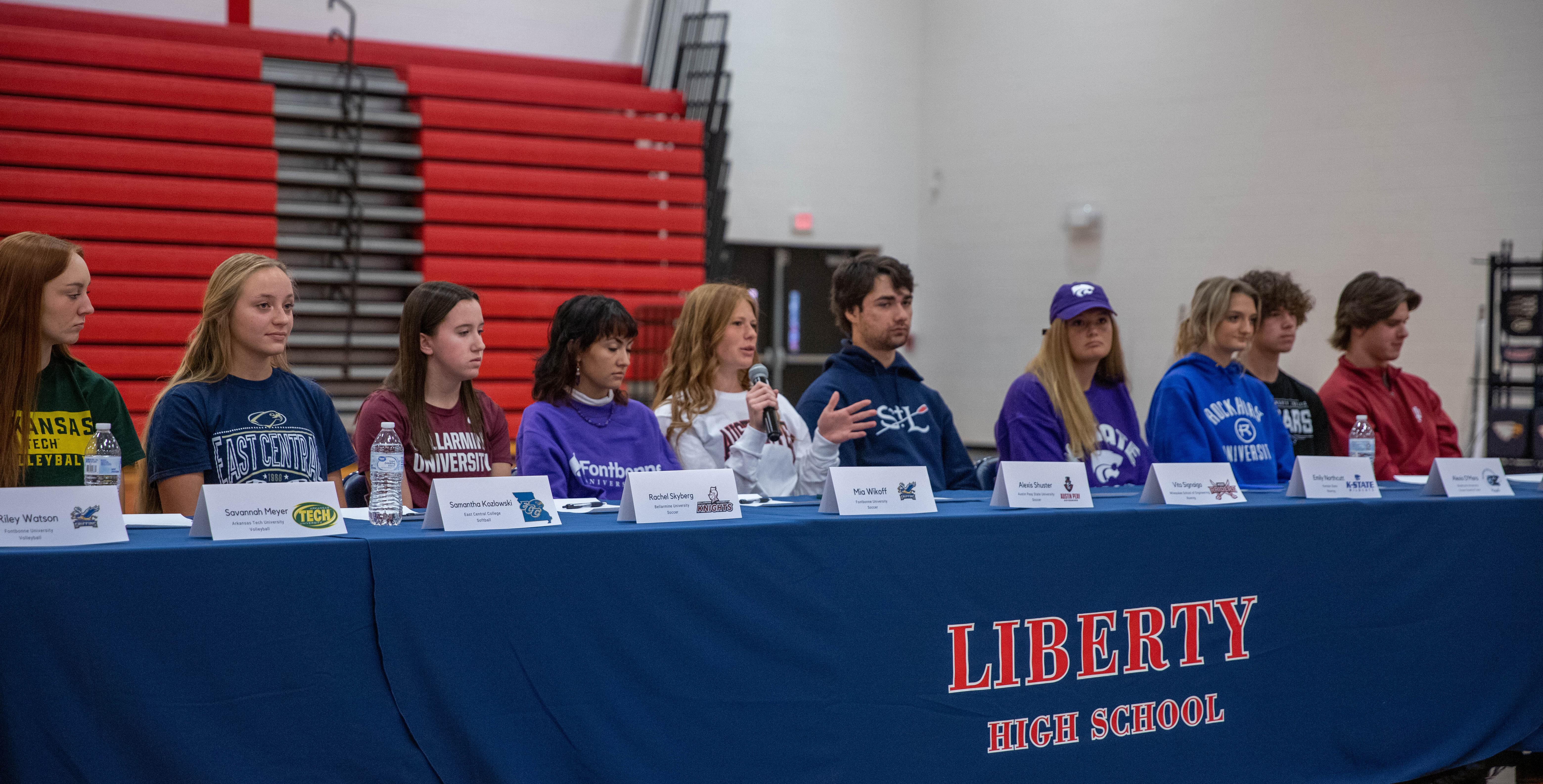
To further facilitate the space available for student writing, advertising will not be offered in The Ledger.
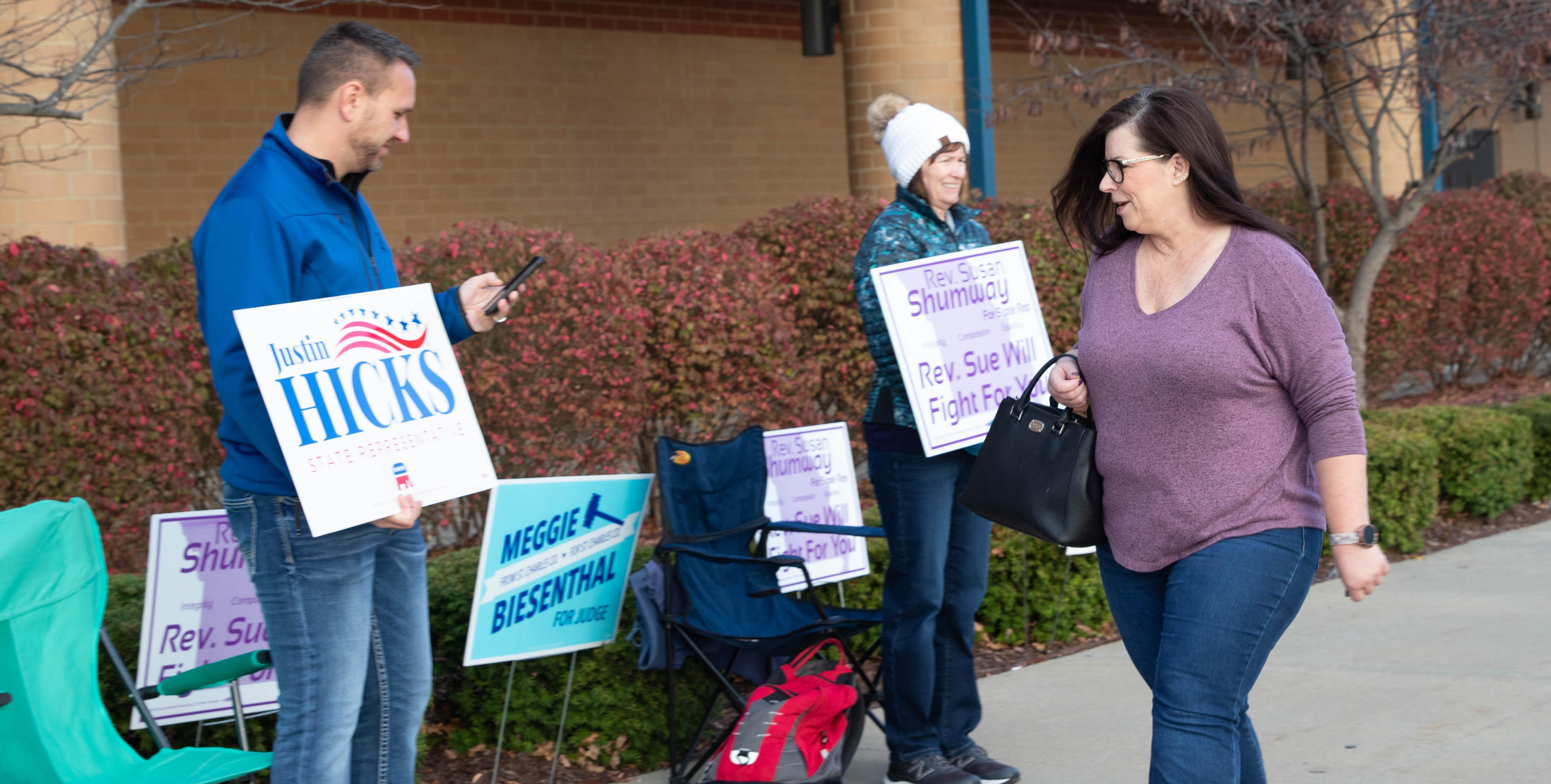
Welcome to the second issue of The Ledger magazine! We earnestly thank readers like you for continuing to support our hard work.
As we carry on with our volume 10 collective theme of the cardinal virtues, we are proud to present our issue pertaining to the concept of justice
From the halls of government and the courts, to the streets and communities where we reside, justice is a concept that touches all of our lives at some point. As students and members of the academic community, this is a topic that is particularly relevant to us, as we seek to understand the often contentious issues that surround justice and its role in society.
The title of this issue, “Injustice For All,” can purposefully be interpreted in many ways, and it stands to represent one of the key challenges in achieving justice - the fact that it is a concept often fraught with complexity and ambiguity. Different individuals have drastically different ideas about what justice means, and what it requires. This often makes it difficult to reach a consensus, and to take effective action when addressing injustice.
We must be willing to acknowledge these complex issues, engage in open and honest dialogue, and work together to find solutions. This requires high levels of empathy, understanding, and a willingness to learn from one another. It especially requires a commitment to standing up for what is right, even when it is difficult or unpopular.
We hope that this installment of The Ledger will provide a thought-provoking and enriching reading experience, and that it will inspire you to consider your own views on justice and how you can play a role in creating a more just and fair world.
regards, Gavin Block & Kay Copeland Editors-in-ChiefThough the presidential elections are known to draw lots of attention, they aren’t the only elections that are important. On Tuesday, Nov. 8, millions of people nationwide gathered around polling centers to vote in this year’s 2022 midterm election. Throughout the day, people came in and out of Liberty to cast their votes.


The midterm elections are held every two years in between the presidential elections, hence the name mid-term. During this time, all 435 seats are to be decided. Members of the Senate are elected for a six-year term, but during midterms one-third of the Senators are to be elected, reelected, or forced to leave their seat, while members of the House of Representatives are elected as usual for their two-year term.
Even though midterms have a lower voter turnout than the presidential election, this election is just as important to the future of our nation. Since the voter turnout is lower, depending on what state you are in and how competitive your state is, it could also be risky. Subsequently, it is important to have the people who are voting to be educated on the topic.
“We are electing people who are going to be making laws; two years for the House, six years for the Senate,” said Mr. Jeremy Tutterrow, one of Liberty’s U.S. Government teachers.
Midterm elections also help influence political views and predict turning points in our country’s politics. Tutterrow goes on to describe that it “takes the polls on where the countries heading politically, as to whether the Democrats are holding onto popularity, or the Republicans are gaining in popularity, which it seems in small amounts happened last night [Nov. 8].”
There are many reasons why the midterm election differs from the big presidential election. In midterm elections, the people are able to vote for their Senate through the power of popular vote. But during the presidential election, the people may vote, but the electors in the Electoral College are the ones who really choose our president in the end.
Midterm elections are also known to have a more educated and widespread focus. Instead of having one to two people in the main spotlight, candidates are being elected in almost every state. But even though there may be fewer voters, the people who choose to vote are more likely to know more about the election and who they are electing. There is also a bigger gap between the ages who vote. Older people are more likely to vote in these elections than young, which is another reason why midterms are known to be a little more educated than the presidential elections.
How important are the midterm elections and what’s the rundown in Missouri?Liberty welcomed many voters who came to participate in the 2022 midterm election on Tuesday, Nov. 8.
statistics compiled by Rebecca Fike, Reporter
U.S. Senate: U.S. Senator
Name Votes Percentage
Jonathan Dine 34,706 1.7%
Eric Schmitt 1,143,626 55.4%
Trudy Busch Valentine 868,873 42.1%
Paul Venable 14,548 0.7%
U.S. House: U.S. Representative, District 1
Name Votes Percentage
Cori Bush 160,042 72.8%
Andrew Jones 53,572 24.4%
George A. Zsidisin 6.166 2.8%
Alan Green 768,500 37.5%
John A. Hartwig Jr. 61,093 3.0%
U.S. Representative, District 2
Name Votes Percentage
Trish Gunby 135,639 43.0%
Bill Slantz 6,486 2.1%
Ann Wagner 173,035 54.9%
U.S. Representative, District 3
Name Votes Percentage
Blaine Luetkemeyer 180,358 65.1% Bethany Mann 96,465 34.8%
Statewide
Name Votes Percentage
Scott Fitzpatrick 1,216,046 59.4%
Alan Green 768,500 37.5%
Statewide Propositions: Missouri Constitutional Amendment 1 will not amend the Missouri Constitution and limit the treasurer to investing state funds only in those investment options currently approved by the Constitution.
Name Votes Percentage
Yes – For the measure 894,056 45.7%
No – Against the measure 1,061,253 54.3%
Missouri Constitutional Amendment 3 vote will amend the Missouri Constitution to remove state prohibitions on the purchase, possession, consumption, use, delivery, manufacture, and sale of marijuana for personal use for adults over the age of 21.
Name Votes Percentage
Yes – For the measure 1,089,326 53.1%
No – Against the measure 961,909 46.9%
Missouri Constitutional Amendment 4 vote will amend the Missouri Constitution to allow the general assembly by law to increase the minimum funding for a police force established by the state board of police commissioners to ensure such police force has additional resources to serve its communities.
Name Votes Percentage
Yes – For the measure 1,265,908 60.2% No – Against the measure 735,835 36.8%
Missouri Constitutional Amendment 5 vote will amend the Missouri Constitution to create the Missouri Department of the National Guard as a new state agency, headed by an adjutant general appointed by and serving at the pleasure of the governor by and with the advice and consent of the senate.
Name Votes Percentage
Yes – For the measure 1,193,908 60.2%
No – Against the measure 788,184 39.8%
Missouri Constitutional Convention Question vote will mean a constitutional convention will be held. It would require the governor to call an election of delegates to serve at a convention for the purpose of revising or amending the Missouri Constitution. Any revisions or amendments will then be put to a vote of the people for their consideration.
Name Votes Percentage
Yes – For the measure 632,200 32.3%
No – Against the measure 1,324,937 67.7%
Missouri Senate: State Senator, District 2
Name Votes Percentage
Nick Schroer 42,448 63.0%
Michael Sinclair 24,909 37.0%
Missouri House: State Representative, District 104
Name Votes Percentage
Phil Christofanelli 7,963 55.7%
Gregory A. Upchurch 6,331 44.3%
“I would just like to remind all people that it’s so important to make your voice heard, so if you are not a registered voter please register to vote.” – Mary Ann Sutton
“Every election is important, this one is even more important because we want to make sure to keep our country and our state on the path it’s been on.” – Matt Becker
Despite the fact that the percentage of young people voting has been low overall, more and more are beginning to take action
by Gavin Block, Co-Editor-in-ChiefFor Election Day of the 2022 national midterms that took place on Tuesday, Nov. 8, numerous citizens who had recently turned 18 raced to their local polling places to participate in democracy. From 6 a.m. to 7 p.m., Americans lined up to place their statement on the ballot.
The plethora of young individuals exercising their right to vote included various seniors attending Liberty High School; some of these students even cast ballots at the polls on campus.
With many young adults engaging in the voting process, this election has seen more Americans of Generation Z joining in on the selection of public servants than ever before. In contrast to the 2020 election, those born in 2003 and 2004 were now able to choose potential leaders.
According to the KIDS COUNT Data Center, voter turnout among U.S. citizens aged 18 to 24 in the 2018 midterm election was 32%. As stated by the aforesaid source, turnout among the same demographic in the 2020 presidential election was 51%. Both times, 18 to 24-year-olds had the lowest turnout of any age cohort.

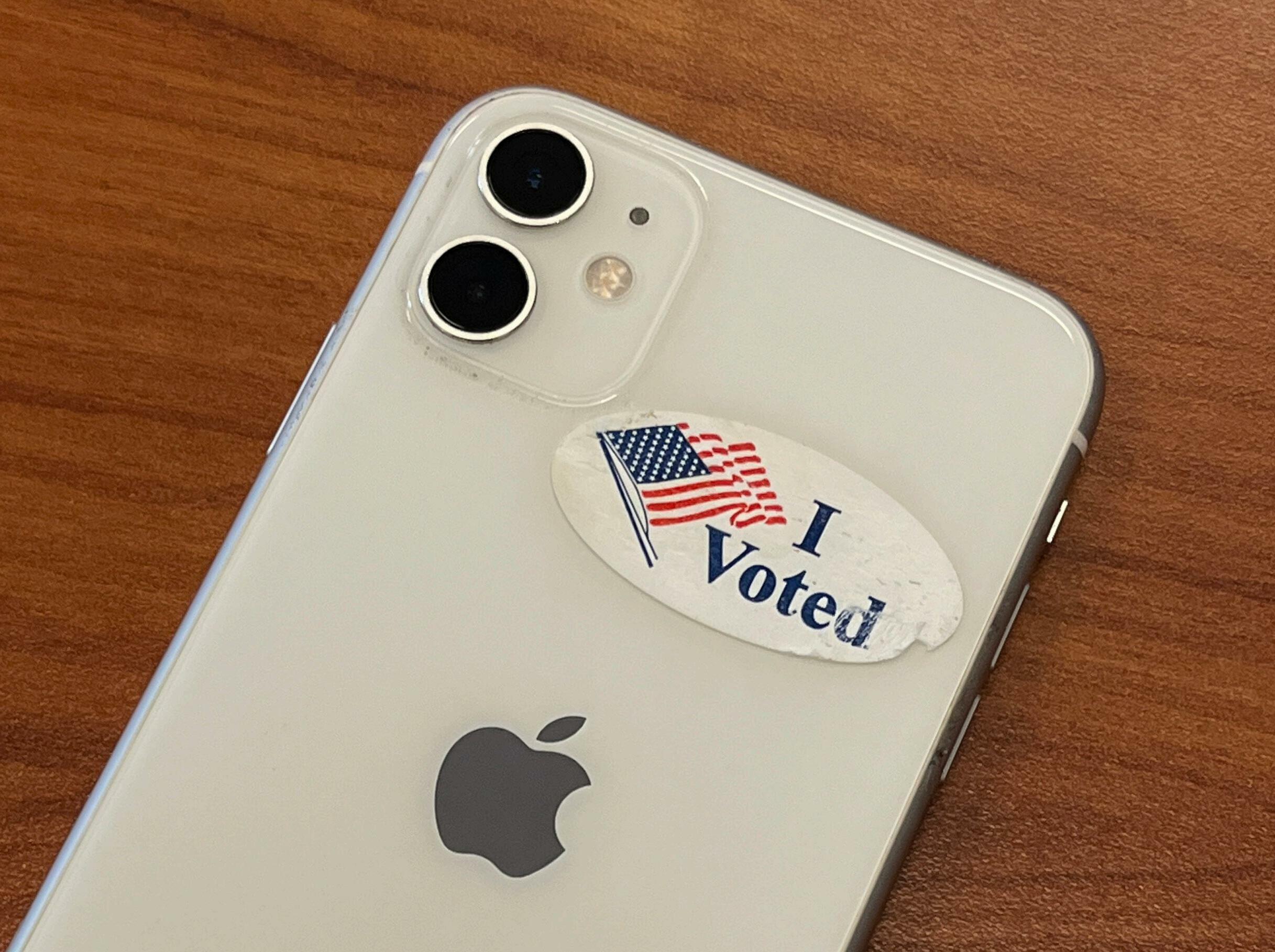
Although those figures are generally low for civic engagement (especially when compared to other nations, such as Sweden and South Korea), they are the age group’s highest involvement percentages of the 21st century. When the official statistics are released for the 2022 midterm elections, it is expected that the number of young people voting will be demonstrated to have increased even more.
Liberty senior Julia Wiley described the voting experience she had at school.
“It was very weird because I would say that the average age of the room was generally old,” Wiley detailed. “I went during lunch, so I just got to vote in the middle of the day. There were maybe four elderly women outside trying to get me to vote ‘no’ on the legalization of marijuana; it was just a very interesting experience because they all thought that I was lost.”
When asked if it is essential that young people vote, Wiley responded, “For sure. It’s the only opportunity that we have to create a change in our lives, and even then, all of the older
| lhstoday.org design by: G. Block graphic via Wikimedia Commonspeople who are currently ruling are going to pass on someday; they don’t have to live through the aftermath and repercussions of their decisions — we do.”
Senior Hailey Davies also voted for the first time.
“I just think it’s important that we share our voice, especially because we’re young and a lot of older people are voting,” Davies said. “Young adults need to get their ideas out there too. It’s our future.”
As a word of advice to students and/or young adults who plan on partaking in elections, Wiley stated, “Get out there and vote with every opportunity you have because it’s the only real effect that we have on our futures.”
“I just think it’s important that we share our voice, especially because we’re young and a lot of older people are voting.”
- Hailey Davies (12)photo by G. Block Young adult voter turnout has been shown to be on the rise in recent years.
This past midterm election cycle drew in millions of voters throughout the nation, who made it clear that they deemed many topics pertinent. Issues most prevalent on the ballot ranged from abortion rights, voting-relating policies and the abolition of language permitting enslavement in state constitutions. Be that as it may, the foremost measure leading Missourians to the polls was one regarding the legalization of recreational marijuana.
Two of the five states with cannabis-related measures on the ballot – Missouri and Maryland – voted in support of each respective measure, further expanding the accessibility and governing of recreational marijuana. Missouri’s Amendment 3 passed with a slim 53-47 margin.
Constitutional Amendment 3, which went into effect on Dec. 8, legalizes the purchase, possession, consumption, use, delivery and sale of recreational cannabis for adults 21 and older. The amendment also outlines the blueprint of a state program regulating who can obtain licenses to grow and sell cannabis recreationally.
With the passage of Amendment 3, Missouri became the first state to immediately expunge the records of people with past nonviolent marijuana-related convictions. The amendment also allows those currently incarcerated for marijuana charges to petition for release.

The sales tax rate on non-medical cannabis will be 6%. There will be additional state and local sales taxes added to the price that cannot exceed 3%. Money raised through the state tax will be deposited to the Veterans, Health and Community Reinvestment Fund, as outlined in Amendment 3.
Legal Missouri 2022 was the campaign registered in support of the amendment, obtaining over 390,000 signatures to get the measure on the ballot. Campaign Manager John Payne – who also managed the successful campaign to legalize medical marijuana in Missouri – released a statement following the passage of Amendment 3.
“I want to personally thank the army of volunteers and supporters who made Missouri legalization and expungement a reality.” Payne wrote, “It’s been a long time coming and we live in a better state for it.”
St. Louis Mayor Tishaura Jones was among those urging voters to reject the amendment. “We deserve better,” she wrote on Twitter, expressing how the amendment falls short on promises of decriminalization.
The amendment does have provisions that prohibit the following: public use of marijuana, driving any motor vehicle under the influence of marijuana, using marijuana in the workplace, and individuals under the age of 21 using marijuana.
Amendment 3 also contains provisions that alter the state’s handling of medical marijuana. For instance, nurse practitioners are now permitted to recommend medical cannabis. Identification cards for medical marijuana will be valid for 3 years instead of 12 months, and the fee for cultivation will be lowered from $100 to $50.
Hemp seeds have been found in civilization as far back as 8000 B.C. in pre-neolithic Japan ruins
The first recorded usage of marijuana dates back as far as 2800 B.C. where records show Chinese Emperor Shen Nung using it medicinally
1787 King Andrianampoinimerina instates capital punishment for marijuana usage in Madagascar
1936 Reefer madness ensues, highly demonizing pot, exaggerating and even falsifying many of its effects
1937 Marijuana Tax Act goes into place, practically taxing the plant out of existence in America
1970 Controlled Substance Act makes the plant a severe felony, initaiting the War on Drugs
Marijuana is classified as a hallucinogen rather than a stimulant or depressant
Users have a 10% chance of developing a cannabis addiction if used even somewhat frequently
The passage of Amendment 3 designates Missouri as the 20th state to legalize recreational cannabis
In recent years, our country has grown more and more politically divided. Talking about politics is like tiptoeing through a field of landmines. Instead of listening to news outlets that place their integrity on trust and transparency, people have started speculating and creating conspiracy theories.
As conspiracy theories become more and more popular, it leaves most people wondering where some of these crazy ideas come from and how they gain so much traction. One possible answer: social media. Apps like Twitter and Facebook are a breeding ground for vicious arguments that often end in insults and extremist views. Politics is less about beneficial discussions on these apps, and more about having the last word.
Social media apps show these controversial posts hoping to make you angry and keep you scrolling for a long time. The more you scroll through the controversial arguments, the more they show up on your feed, which in turn makes you scroll more, and so on. It’s a dangerous cycle, and it’s all for these social media companies to make as much profit as possible.
As a teenager in the era of technology and social media, I’ve seen so many people online, specifically on Twitter, contributing to conspiracy theories and an unhealthy distrust of the government. Recently, an attack took place on Speaker of the House Nancy Pelosi’s husband, Paul Pelosi, and allegedly the attacker admitted he wanted to kidnap the Speaker. This was an attack on democracy and the nobility of our country, but many people weren’t concerned about that. Every time this attack is mentioned, I feel as though no one talks about how this was a horrible thing for someone to do, but debating whether or not it was an inside job, or questioning the relationship between Paul and his attacker. It’s disgusting that instead of being worried, or at least empathetic, about an old man who got a skull fracture from being hit with a hammer, people only care about the conspiracies that are being created.
It’s not just this one attack either. Things like the insurrection on Jan. 6, 2021, when 2020 election-deniers stormed the Capitol building. When Biden won the 2020 election, some people who supported Trump refused to accept defeat, and instead of listening to even their own party say that there was no evidence of voter fraud, they took it to social media. Again, apps like Twitter and Facebook became overrun with conspiracy theorists spreading lies and dividing our country.
As our country continues to experience growing hostility between the far-right and far-left, it leaves people wondering the direction our nation is headed. Radical views can make people believe they are fighting for some sort of justice, when in reality they’re only causing harm. About 50% of American voters believe that someone’s political opinions reveal whether they’re a good person or not. It probably doesn’t help that certain political views are associated with conspiracies or stereotypes, allowing people to make assumptions about someone based solely on their biases.
When it comes to conspiracies and extremism, democracy and unity are at risk. Separation and hate is an obstacle we have to overcome if we want to keep our country safe. A nation divided is not a nation at all.
by: E. ThimyanYou never think that it will happen to your community. Each year, the horror-filled headlines only seem to gain momentum until they all blur together. Yet you never think the ineffable tragedy will strike your area, until it does. All of a sudden, national headlines host the name of your city while images of your community – grieving what may be the most traumatic event they’ve endured – are plastered across the population’s social media feeds.
For the city of St. Louis and the families of Central Visual & Performing Arts High School, this horror became a reality in October. A gunman and former CVPA student, 19-year-old Orlando Harris, infiltrated the building on the morning of Oct. 24, murdering two and injuring nine others.
Harris took the lives of a 15-year-old student, Alexzandria Bell, and a 61-year-old teacher, Jean Kuczka. Harris was killed in the attack after exchanging gunfire with police.
Not only the surrounding community, but the nation gathered around mere hours after the attack, painstakingly waiting for any and all information to be released.
Liberty senior Lillia Clay was not aware about the attack until weeks after it happened. With the ambush occurring in St. Louis, a city with a notable gun violence epidemic, it’s not hard to understand Clay’s perspective.
“I’m a little bit shocked and kind of scared. Kids that do this typically are known for having issues at home and I’m scared that this can happen to anyone,” Clay expressed. “It’s really saddening, especially since it happened in a city as dangerous as St. Louis.”
Though Clay has not processed the weight of this tragedy for as long as most of the community has, she still understands the importance behind the conversation of gun violence prevention.
“This can happen to anybody, whether it be here
in Lake St. Louis or far away in Florida or California, or anywhere else,” Clay explained. “Having this conversation is beneficial because it can prevent this from happening again and bring more awareness to the safety of students and teachers.”
Junior Victoria Nguyen heard about the shooting when she got home from school that day. Her parents informed her that the Wentzville School District Superintendent, Dr. Danielle Tormala, sent out an email addressing the attack.
“I thought about how this isn’t common in Missouri. I was especially shocked to hear it happened in St. Louis because I used to live there,” Nguyen recollected.
Even though a school building should be one of the safest places for children to be, Nguyen spoke about the looming feeling parents know all too well when they send their children off to school.
“I’ve seen videos of kindergartners having to have a bulletproof shield in the back of their backpacks. It’s so sad that nowadays we have to do this.” Nguyen continues, “Instead of sending your kids off to school and wishing them a good day, parents have to worry about their kids getting shot.”

Nguyen concludes by conveying her vision for the future of gun violence prevention. While understanding that a gun is needed for self defense circumstances, she still believes that the process behind obtaining a gun needs to be revamped.
“To get a gun, you need to be interviewed, have a background check done; I think it should be a long process. In so many places throughout America, you can just straight up buy a gun.” Nguyen expressed, “I understand getting a gun for personal protection, that’s entirely reasonable. Someone broke into my garage so I understand why you would get one for self defense, but the process to get a gun needs to be more extensive.”

A trend among young people that has been standing out prominently on social media, especially the platform TikTok, is “quiet quitting.” This concept involves an employee putting no more effort into their work than absolutely necessary.
A synonym for this idea is “acting your wage,” where individuals will place the amount of energy into their work that reflects the amount they are getting paid.
Some believe that the trend is a result of many employees reflecting on and reevaluating their occupations following the COVID-19 pandemic.
According to Insider, the trend appeared to have originated from a TikTok video posted in March 2022 by Generation X career coach and YouTuber Brian Creely. He referred to an Insider headline that read, “Fed up with long hours, many employees have quietly decided to take it easy at work rather than quit their jobs.”
One reason this phenomenon may be occurring is that citizens in the working world are realizing that they are simply not being paid enough to do their job.
A popular graph obtained via Wikimedia Commons demonstrates that since around the early 1970s and the conclusion of the Bretton Woods Agreements (which intended to create an international monetary system that would encourage economic growth), there has been a remarkable disconnect between worker productivity and wages. Although output has steadily increased over time, pay has visibly remained stagnant overall.
As a result, employees may see this diagram or perceive it through real life experiences and become demotivated at work. Young workers could grow apathetic early in their careers and cause a considerable mass decrease in productivity in the near future.
Many believe that companies are exploiting employees’ inability to say “no,” especially younger employees. Consequently, jobholders may become overworked and lose hope in their occupation.
There were 53 Liberty students who recently responded to a survey that contained questions concerning their employment experience.
As one would expect, the majority of those who answered to the survey were seniors at 41.5%, followed by juniors at 26.4%, sophomores at 18.9% and freshmen at 13.2%.
About half of the students polled said they worked at either fast food or retail jobs and 15.1% stated that they worked in service, while the rest said they were employed in one of an assortment of different job types.
Just over half of those surveyed said that they were not currently employed at their first job. Most of these people who claimed that they had been employed two or more times expressed that their work experiences have been overall somewhat positive.
Well over half (67.9%) of the students said they generally enjoy their current job, and 69.8% of the students stated that their bosses/higher-ups were agreeable and reasonable.
However, when the individuals were asked if they can be taken advantage of at their place of work due to their young age, a fairly large margin of 32.1% answered “yes” and 26.4% said “somewhat.” On the other hand, 41.5% answered “no” to this question.
lhstoday.org design by: G. Block & C. Goins58.5% of Liberty students who responded to a survey said that they felt they can be at least somewhat taken advantage of at their job due to their youth. screenshot of Google Form
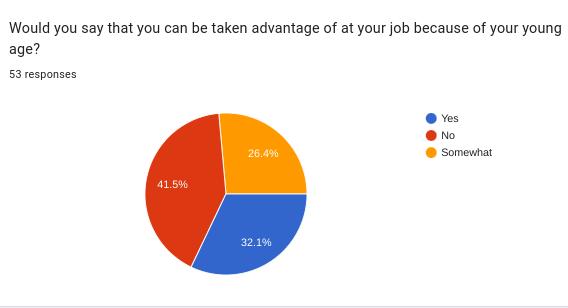
Some young people may be apprehensive about their future employment by Gavin Block, Co-Editor-in-Chief
Since the 1970s, productivity and worker pay in the United States have apparently become increasingly separated.
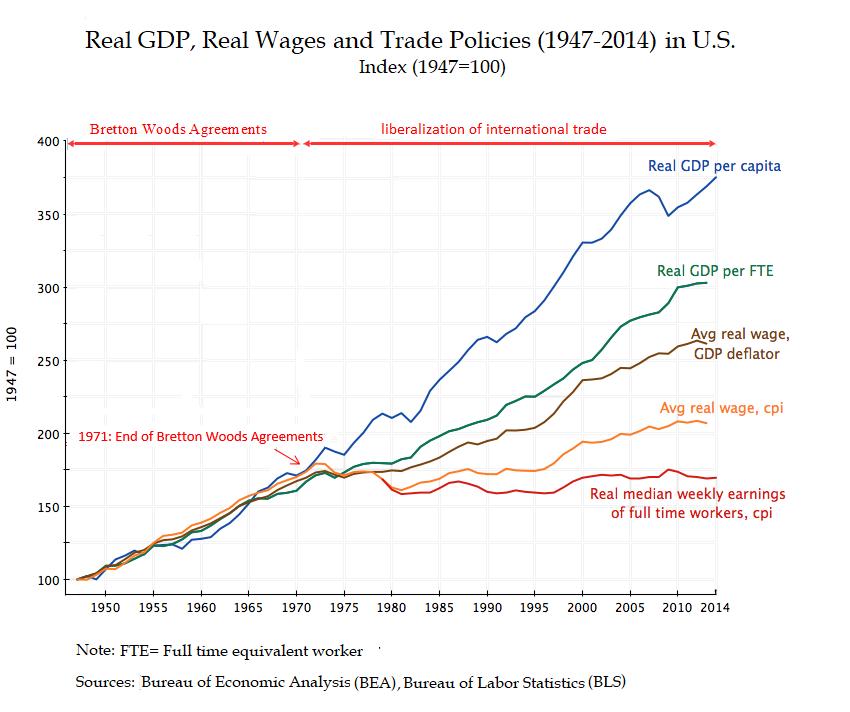
Many teenage employees have been taught that the directions of their bosses and authoritative figures should be followed without question, leaving them vulnerable to a demanding working environment.
The final query of the study was what each student’s biggest concern was as they looked to enter the working world. Some examples included many conveying the fear of not finding happiness in their profession as well as working too many hours.
Senior Vianca Malave-Torres, who works in service, believes that she can be manipulated at her job because of her adolescence.
“My biggest concern was trying to get respect as a worker at such a young age among people who are significantly older, have more experience than I do and sometimes forget they started out like me,” noted Malave-Torres.
One student concisely responded that their greatest concern would be “Karens.” Although this reply sounds facetious, it precisely asserts the prominent issue of workers having to deal with difficult customers in the current service climate.

Junior Payton Grotewiel remarked that her biggest worry is “not getting paid enough or having to work long hours and not being able to get out of it.”
Although quiet quitting has been a rather widespread issue, a great deal of young people are determined to work hard and make the most of their job experiences. Still, many have uncertainties and anxieties in regards to the workforce and how they will navigate it. As individuals undergo their learning experience in employment and process it, they can have the possibility of discovering what they truly want to pursue.
“My biggest concern was trying to get respect as a worker at such a young age among people who are significantly older, have more experience than I do and sometimes forget they started out like me.”
- Vianca Malave-Torres (12)
Musk replied to Ocasio-Cortez with “Your feedback is appreciated, now pay $8.” Musk would also post a screenshot of Ocasio-Cortez’s merchandise, seemingly criticizing her for the $58 price tag. This almost instantly went viral with thousands of retweets and likes.

Ocasio-Cortez hit back at Musk once more, stating, “My workers are union, have full healthcare + benefits like childcare help, and every one is paid a living wage. Proceeds go to community acts like tutoring undeserved kids.” Ocasio-Cortez continued, “You’re a union buster with an ego problem who pockets the change from underpaying and mistreating people.”
This is only the start to Musk’s new vision for Twitter; he has stated that he plans on making many changes to the app. Some notable changes Musk has alluded to include removing the influx of bot accounts, implementing better payouts for creators, and forming a content moderation council. Some are in support of Musk’s work so far, and others, not so much. All that’s left to do is wait and see what Musk has to bring to the platform next.
“Let that sink in!” reads a recent tweet by Elon Musk, the new CEO of Twitter. Back in April 2022, Musk wanted to buy a chunk of the company. When he made this proposal, Twitter users and others found this to be a questionable choice. All over the internet, people were making comments and even joking about Musk’s decision.
Musk was still committed to buying part of Twitter. The CEO and co-founder, Jack Dorsey, decided on letting Musk own 9% of the company. After the purchase, the public commotion quickly ended and no one thought much about it. Soon after, Musk went back to working on his other projects for the next few months.
Then in October 2022, Musk came back for another round at Twitter. He purchased the entire company, which would lead him to becoming the brand new CEO.
Twitter immediately started being worked on by Musk, with some very quick changes to the company and app. One of the very first things Musk did was fire thousands upon thousands of employees. People became very upset and angry with this action. Musk’s response to this was, “Cutbacks were needed because the company loses millions of dollars everyday.” This haste decision would catch back up with Musk, as he recently made an attempt to rehire many employees he laid off.


One of the other changes Musk made was creating an $8/mo. subscription plan for anyone who is verified on Twitter. He originally wanted to charge $20/mo. for the service, yet brought it down to $8 following widespread criticism.
Many people with the verification check mark were upset. One of these people was U.S. Representative Alexandria Ocasio-Cortez who took to Twitter writing, “Lmao at a billionaire earnestly trying to sell people on the idea that ‘free speech’ is actually a $8/mo subscription plan.”
design by: T. Koehnemann

In a modern world where new ideas are constantly brought up and views are adapting, being able to speak your mind is practically persecuted by
A new idea. An opinion. An argument. A solution. A retaliation. This is the experience many have gone through when using social media and even in-person encounters. In this day and age, there are individuals who describe having gone through a situation such as this where people wish to express their thoughts or even question an idea as they are confused, but they are hounded by groups almost like a pack of dogs that try and tear them down, even if they agree to compromise.
It is with no great opposition in agreeing that a vast majority of social life now takes place in a virtual space. This digital world of constant news, updates, tragedies, triumphs, and much more is always changing and moving along; it never stops. In this great wave of information, it’s easy to get lost or fall victim to hysteria, as it is near impossible to know what is always happening as it’s a world of billions of people, each telling their own stories. How are these platforms moderated and how do we ensure they stay spaces for all? This is a question that has been in people’s minds since the creation of the first AOL chat rooms. It is without doubt that someone will always have an issue with how online etiquette should be formalized and performed. It seems to be increasingly difficult to find common ground on this subject as many wish for entire lists of people to be personally censored while others wish for total lack of administration and let every individual say as they would like.
Censorship has changed, grown and adapted all through history from burning books to imprisoning speakers, sometimes going as far as to execute people that they feel shouldn’t be allowed to share their thoughts or writing. On a global scale a lot of this can still be seen, history being erased, groups being suppressed, and the general public having important facts hidden from them. While America has had much less crackdowns on journalists and our press being free much through our expansion, one of the best examples was the rise of Muckrakers digging deep into companies’ frauds and wrongdoings
Cade Goins, Reporteras well as politicians, making sure everyone is held accountable. However, now we see some of the most biased and deceptive media coverage in our own country.
It is not difficult to see that many of our major news sources always come with a bias and that so little now give full stories in an unbiased fashion that informs rather than making stories opinionated or even going as far as demonizing groups or people that may be involved in a story that goes against their beliefs. Much of televised reporting is massively paid for by companies, lobbyists, and even politicians to report a specific way or ignore stories that appear much more urgent than what they may be covering as it harms their sales or reputation.
Much of the online forums and internet has quickly become attuned to the same way of thinking, but to a worse degree as they can interact personally with their audience or other individuals compared to speaking to a screen with no feedback. Cyberbullying and cybercrime grows in cases. In just the time frame of Oct. 2016 to the start of 2017, there were 34 attacks significant enough to elicit a cross government response to the threats of personal data being leaked and the attacks and crimes related to them. These attacks and breaches only continue to increase, and these large cases do not include the hundreds of daily attacks on people personally.
Many users of social media report feelings of being repressed by others. Senior Allison Griffin-Fischer elaborates on how she feels in the present social media climate.
“Go on Snapchat, Instagram, TikTok, or others and people just present themselves in foreboding ways that strike fear in allowing people to express themselves.” When asked about what feels restricted or rather what she is scared of sharing publicly, Griffin-Fischer replies, “Acceptance is the big thing. I see people all around scared of identifying how they feel in terms of sexuality or hobbies as bullying has just grown. This has been an ongoing problem and it has ramped up way more in recent times compared to where the
internet has come from and it has spread to be really bad everywhere. However this isn’t to say that there aren’t a lot of good safe spaces still out there, but overall online has become a worse place than a good place.”
It is unequivocal that digital spaces are becoming increasingly tense and aggressive. The question that remains: is it possible to be fixed? With discrimination and disdain to both minorities and the common man, it seems that no matter what someone attempts to do to evade being roped into a negative perspective is nigh impossible with judgements and stereotypes being constantly pushed against people who wish to maintain neutrality and enjoy the internet.
Frankly, the behaviors being witnessed are inexcusable to the unity and cooperation that we once saw in humanity, now shattered to nothing but remnants of small people trying to do their best to spread positivity in an otherwise increasingly cruel world. But those people are exactly the type that can help bring the people back together by showing that differing opinions are still okay and that it does not separate us as humans. In a world so divided by culture, opinion, politics, and even traits as trivial as hobbies, the ropes holding us together grow thinner, yet there are many individuals who work to maintain the good of humanity.
It is true that many people will always be divided on their views or beliefs, but it is up to the world to be able to come past this and understand again that having an opposing stance on a topic does not make the other person an enemy. As a popular motto states, “Hate the sin, love the sinner.” Disagreements are a part of human nature, we would not be in the world today without several centuries of civilized debate leading to discoveries and compromises. However, in this return to uncivilized attacks and degradation of the opposing side, opponents are tossing aside their humanity, and people are returning to the primacy of kill and take.
Opinion lhstoday.org design by: C. StengerCensorship? Freedom of speech? Cancellation? Shut down? No Individualism? Cruel? Sin? Disagreement? Degradation? Compromise? Inhuman? Bias or Unbias? Repression? Neutralization? Inexcusable? Unacceptable? Divided Beliefs? Trivial? Uncivilized? Censorship? Freedom of speech? Neutralization? Inexcusable? Unacceptable? Divided Beliefs? Trivial? Uncivilized? Censorship? Freedom of speech? Cancellation? Shut down? No Individualism? Cruel? Sin? Disagreement? Degradation? Compromise? Inhuman? Bias or Unbias? Repression? Neutralization? Inexcusable? Unacceptable? Divided Beliefs? Trivial? Uncivilized? Censorship? Freedom of speech? Cancellation? Shut down? No Individualism? Cruel? Sin? Disagreement? Degradation? Compromise? Inhuman? Bias or Unbias? Repression? Neutralization? Inexcusable? Unacceptable? Divided Beliefs? Trivial? Uncivilized? Censorship? Freedom of speech? Cancellation? Shut down? No Individualism? Cruel? Sin? Disagreement? Degradation? Compromise? Inhuman? Bias or Unbias? Repression? Neutralization? Inexcusable? Unacceptable? Divided Beliefs? Trivial? Uncivilized? Censorship? Freedom of speech? Cancellation? Shut down? No Individualism? Cruel? Sin? Disagreement? Degradation? Compromise? Inhuman? Bias or Unbias? Repression? Neutralization? Inexcusable? Unacceptable? Divided Beliefs? Trivial? Uncivilized? Censorship? Freedom of speech? Cancellation? Shut down? No Individualism? Cruel? Sin? Disagreement? Degradation? Compromise? Inhuman? Bias or Unbias? Repression? Neutralization? Inexcusable? Unacceptable? Divided Beliefs? Trivial? Uncivilized? Censorship? Freedom of speech? Cancellation? Shut down? No Individualism? Cruel? Sin? Disagreement? Degradation? Compromise? Inhuman? Bias or Unbias? Repression? Neutralization? Inexcusable? Unacceptable? Divided Beliefs? Trivial? Uncivilized? Censorship? Freedom of speech? Cancellation? Shut down? No Individualism? Cruel? Sin? Disagreement? Degradation? Compromise? Inhuman? Bias or Unbias? Repression? Neutralization? Inexcusable? Unacceptable? Divided Beliefs? Trivial? Uncivilized? Censorship? Freedom of speech? Cancellation? Shut down? No Individualism? Cruel? Sin? Disagreement? Degradation? Compromise? Inhuman? Bias or Unbias? Repression? Neutralization? Inexcusable? Unacceptable? Divided Beliefs? Trivial? Uncivilized? Censorship? Freedom of speech? Cancellation? Shut down? No Individualism? Cruel? Sin? Disagreement? Degradation? Compromise? Inhuman? Bias or Unbias? Repression? Neutralization? Inexcusable? Unacceptable? Divided Beliefs? Trivial? Uncivilized? Censorship? Freedom of speech? Cancellation? Shut down? No Individualism? Cruel? Sin? Disagreement? Degradation? Compromise? Inhuman? Bias or Unbias? Repression? Neutralization? Inexcusable? Unacceptable? Divided Beliefs? Trivial? Uncivilized? Censorship? Freedom of speech? Cancellation? Shut down? No Individualism? Cruel? Sin? Disagreement? Degradation? Compromise? Inhuman? Bias or Unbias? Repression? Neutralization? Inexcusable? Unacceptable? Divided Beliefs? Trivial? Uncivilized? Censorship? Freedom of speech? Cancellation? Shut down? No Individualism? Cruel? Sin? Disagreement? Degradation? Compromise? Inhuman? Bias or Unbias? Repression? Neutralization? Inexcusable? Unacceptable? Divided Beliefs? Trivial? Uncivilized? Censorship? Freedom of speech? Cancellation? Shut down? No Individualism? Cruel? Sin? Disagreement? Degradation? Compromise? Inhuman? Bias or Unbias? Repression? Neutralization? Inexcusable? Unacceptable? Divided Beliefs? Trivial? Uncivilized? Censorship? Freedom of speech? Cancellation? Shut down? No Individualism? Cruel? Sin? Disagreement? Degradation? Compromise? Inhuman? Bias or Unbias? Repression? Neutralization? Inexcusable? Unacceptable? Divided Beliefs? Trivial? Uncivilized? Censorship? Freedom of speech? Cancellation? Shut down? No Individualism? Cruel? Sin? Disagreement? Degradation? Compromise? Inhuman? Bias or Unbias? Repression? Neutralization? Inexcusable? Unacceptable? Divided Beliefs? Trivial? Uncivilized? Censorship? Freedom of speech? Cancellation? Shut down? No Individualism? Cruel? Sin? Disagreement? Degradation? Compromise? Inhuman? Bias or Unbias? Repression? Neutralization? Inexcusable? Unacceptable? Divided Beliefs? Trivial? Uncivilized? Censorship? Freedom of speech? Cancellation? Shut down? No Individualism? Cruel? Sin? Disagreement? Degradation? Compromise? Inhuman? Bias or Unbias? Repression? Neutralization? Inexcusable? Unacceptable? Divided Beliefs? Trivial? Uncivilized? Censorship? Freedom of speech? Cancellation? Shut down? No Individualism? Cruel? Sin? Disagreement? Degradation? Compromise? Inhuman? Bias or Unbias? Repression? Neutralization? Inexcusable? Unacceptable? Divided Beliefs? Trivial? Uncivilized? Censorship? Freedom of speech? Cancellation? Shut down? No Individualism? Cruel? Sin? Disagreement? Degradation? Compromise? Inhuman? Bias or Unbias? Repression? Neutralization? Inexcusable? Unacceptable? Divided Beliefs? Trivial? Uncivilized? Censorship? Freedom of speech? Cancellation? Shut down? No Individualism? Cruel? Sin? Disagreement? Degradation? Compromise? Inhuman? Bias or Unbias? Repression? Neutralization? Inexcusable? Unacceptable? Divided Beliefs? Trivial? Uncivilized? Censorship? Freedom of speech? Cancellation? Shut down? No Individualism? Cruel? Sin? Disagreement? Degradation? Compromise? Inhuman? Bias or Unbias? Repression? Neutralization? Inexcusable? Unacceptable? Divided Beliefs? Trivial? Uncivilized? Censorship? Freedom of speech? Cancellation? Shut down? No Individualism? Cruel? Sin? Disagreement? Degradation? Compromise? Inhuman? Bias or Unbias? Repression? Neutralization? Inexcusable? Unacceptable? Divided Beliefs? Trivial? Uncivilized? Censorship? Freedom of speech? Cancellation? Shut down? No Individualism? Cruel? Sin? Disagreement? Degradation? Compromise? Inhuman? Bias or Unbias? Repression? Neutralization? Inexcusable? Unacceptable? Divided Beliefs? Trivial? Uncivilized? Censorship? Freedom of speech? Cancellation? Shut down? No Individualism? Cruel? Sin? Disagreement? Degradation? Compromise? Inhuman? Bias or Unbias? Repression? Neutralization? Inexcusable? Unacceptable? Divided Beliefs? Trivial? Uncivilized? Censorship? Freedom of speech? Cancellation? Shut down? No Individualism? Cruel? Sin? Disagreement? Degradation? Compromise? Inhuman? Bias or Unbias? Repression? Neutralization? Inexcusable? Unacceptable? Divided Beliefs? Trivial? Uncivilized? Censorship? Freedom of speech? Cancellation? Shut down? No Individualism? Cruel? Sin? Disagreement? Degradation? Compromise? Inhuman? Bias or Unbias? Repression? Neutralization? Inexcusable? Unacceptable? Divided Beliefs? Trivial? Uncivilized? Censorship? Freedom of speech? Cancellation? Shut down? No Individualism? Cruel? Sin? Disagreement? Degradation? Compromise? Inhuman? Bias or Unbias? Repression? Neutralization? Inexcusable? Unacceptable? Divided Beliefs? Trivial? Uncivilized? Censorship? Freedom of speech? Cancellation? Shut down? No Individualism? Cruel? Sin? Disagreement? Degradation? Compromise? Inhuman? Bias or Unbias? Repression? Neutralization? Inexcusable? Unacceptable? Divided Beliefs? Trivial? Uncivilized? Censorship? Freedom of speech? Cancellation? Shut down? No Individualism? Cruel? Sin? Disagreement? Degradation? Compromise? Inhuman? Bias or Unbias? Repression? Neutralization? Inexcusable? Unacceptable? Divided Beliefs? Trivial? Uncivilized? Censorship? Freedom of speech? Cancellation? Shut down? No Individualism? Cruel? Sin? Disagreement? Degradation? Compromise? Inhuman? Bias or Unbias? Repression? Neutralization? Inexcusable? Unacceptable? Divided Beliefs? Trivial? Uncivilized? Censorship? Freedom of speech? Cancellation? Shut down? No Individualism? Cruel? Sin? Disagreement? Degradation? Compromise? Inhuman? Bias or Unbias? Repression? Neutralization? Inexcusable? Unacceptable? Divided Beliefs? Trivial? Uncivilized? Censorship? Freedom of speech? Cancellation? Shut down? No Individualism? Cruel? Sin? Disagreement? Degradation? Compromise? Inhuman? Bias or Unbias? Repression? Neutralization? Inexcusable? Unacceptable? Divided Beliefs? Trivial? Uncivilized? Censorship? Freedom of speech? Cancellation? Shut down? No Individualism? Cruel? Sin? Disagreement? Degradation? Compromise? Inhuman? Bias or Unbias? Repression? Neutralization? Inexcusable? Unacceptable? Divided Beliefs? Trivial? Uncivilized? Censorship? Freedom of speech? Cancellation? Shut down? No Individualism? Cruel? Sin? Disagreement? Degradation? Compromise? Inhuman? Bias or Unbias? Repression? Neutralization? Inexcusable? Unacceptable? Divided Beliefs? Trivial? Uncivilized? Censorship? Freedom of speech? Cancellation? Shut down? No Individualism? Cruel? Sin? Disagreement? Degradation? Compromise? Inhuman? Bias or Unbias? Repression? Neutralization? Inexcusable? Unacceptable? Divided Beliefs? Trivial? Uncivilized? Censorship? Freedom of speech? Cancellation? Shut down? No Individualism? Cruel? Sin? Disagreement? Degradation? Compromise? Inhuman? Bias or Unbias? Repression? Neutralization? Inexcusable? Unacceptable? Divided Beliefs? Trivial? Uncivilized? Censorship? Freedom of speech? Cancellation? Shut down? No Individualism? Cruel? Sin? Disagreement? Degradation? Compromise? Inhuman? Bias or Unbias? Repression? Neutralization? Inexcusable?
On the first day of National Signing Day, 11 Liberty athletes made their next chapter in their education official. They signed a national letter of intent to continue their athletic careers Wednesday morning, Nov. 9.
Signing day is when student-athletes, who have received scholarships for their sports, are asked questions about how they got to where they are and what their plans are for their futures. They were joined in the gym by family, friends and coaches.


All 11 students who attended signing day were recruited for their ability in their respective athletic fields. However, these students aren’t only going to these schools for their athletic programs, but also for their future careers.
Alexis O’Mara, who was recruited by Rockhurst University for her track and field skills, chose to go to Rockhurst because of their excellent business program. Her dream is to be an accountant, and she believes that their program was best suited for her and her career path.
Not all of these students know what direction they want to take in their lives. Mia Wikoff, who decided to go to Fontbonne for her excellent soccer skills, hasn’t quite decided what career to take on. All she knows is that it’ll most likely involve one of her two passions: art and English.
The scholarships these students received for their athletic abilities will help them pay for college, and pave the way for their future careers.
As Robert Collier said, “Success is the sum of small efforts repeated day in and day out.” The students here at LHS exemplify this, and we look forward to seeing them spread their wings and fly from Liberty’s nest.
Sam Kozlowski - Softball - East Central College
Alexis Shuster - Soccer - Austin Peay University
Emily Northcutt - Rowing - Kansas State University
Rachel Skyberg - Soccer - Bellarmine University
Savannah Meyer - Volleyball - Arkansas Tech University
Vito Signaigo - Rowing - Milwaukee School of Engineering
Aidan Cole - Baseball - St. Charles Community College
Alexis O’Mara - XC/Track & Field - Rockhurst University
Seth Benes - Baseball - Indiana University
Mia Wikoff - Soccer - Fontbonne University
Riley Watson - Volleyball - Fontbonne University
design by: C. SmithLeading the girls swim team this year is a new coach by the name of Hannah Kerr. Kerr is an alumni of Liberty, having graduated in 2018, and she was also on the girls swim team all four years of her high school career. She is the head coach of Liberty boys swim, and she is now assistant coaching the girls swim team.

With a new coach comes new experiences and dynamics for the team. Luckily, numerous teammates agree that Coach Kerr has been a fantastic addition.
“This team has started out strong this season,” Kerr said. “I expect the team will continue to grow not only in skill and speed but also in their team bonding. This team works extremely well together which will continue to result in accumulating individuals to relay personal records and overall wins at the meets.”
Kerr believes that the team has a pleathora of strengths. She described some of these strengths, stating, “Our team continues to work together to reach a common goal of improving throughout the season in skills and speed - which is achieved by adjusting based on coach-to-peer critiques, self-to-peer competition, and overall bonding through shared experiences. Each swimmer will continue to improve as they fully participate in every intense practice and meet. The team is strong in their commitment to the sport and to their team in personal growth, which is constant.”
Green has big goals for this swim season. She states, “I’m a junior now, so I believe it’s time for us juniors to step up, since the seniors are leaving. But since all of us juniors get along pretty well, I’m not worried.”
Green mentioned how she’s adjusting this season, explaining that it has been a different experience compared to years past. She notes, “Since I’m a junior now, I’ll have to possibly start giving rides to sophomores and freshmen. We’ll have to start planning senior gifts. We’re going to swim practice with a positive attitude - I’m putting my feelings aside.”
Green described her strongest quality. “Freestyle is my best stroke, it’s the stroke I have the best time in. I’ve been good at freestyle for a while in general.”

She also detailed the strengths of her team members. “Swimming wise, they are all really good at what they do. Character wise, they are all really kind. They helped me transition into high school swim as a freshman. They helped me to gain more confidence. They bring a lot of positivity and smiles, and if I’m in a bad mood they help.”
While Wagner does miss the previous coach, she’s happy to welcome Kerr this year. She states, “I would say, I do miss Althage. She was my Spanish teacher in middle school, so I do miss her personally. I would say coach Hannah [Kerr] and Whitmore are really good for us though.”
Wagner said about Kerr, the new coach, “I personally really like her. I do have some bias because I used to be best friends with her sister around fifth grade, so I’ve known Hannah for years. Hannah was a former Liberty swimming alumni. She is really good at creating hard workouts for us.”
Wagner’s plans for this season consist of improving her freestyle and breaststroke. She also noted, “I do have hopes in taking up the challenge of becoming better at backstroke, hopefully swimming back in the medley relay.”
Her favorite stroke would be breaststroke because she thinks it’s her strongest skill. “I made state consideration time in the 100 breaststroke, so it’s kind of if you’re good at it, you like it. Also, it’s a stroke I feel like I don’t get as tired in,” Wagner stated.
design by: C. Smith
We have entered the era of modern remakes and it is killing original storytelling. Everywhere you look you see Disney doing remakes, “Beauty and The Beast,” “Dumbo,” “Pinocchio.” They’ve also made spin offs based on old concepts i.e “Cruella,” “Maleficent,” “Mary Poppins Returns,” and the list unfortunately goes on. Other movie companies have taken media and made it modern such as video game movies. Broadway has also adopted this era of storytelling. “Legally Blonde The Musical,” “Mean Girls The Musical,” “Beetlejuice The Musical,” “Elf The Musical,” the list goes on, and on, and on and on.
A lot of the Broadway shows listed above are stellar shows, and the Disney remakes didn’t start out bad – “Cinderella” (2015) is a great rendition of their classic movie – but they’ve quickly gotten stale to audiences and the remakes have even become memes. So what happened to original storytelling? Why is there a shortage of original stories coming out of the woodworks?
Taking a step back, you might start to think about the state of the world. Since the Earth is going deeper into the climate crisis, an ever growing political divide festers in the US, and the Ukraine-Russia war still rages, it’s easy to see why comfort movies of our childhoods would resurface to give us all solace in the trying times we’re facing.
Turns out, this has been studied before. In the 1970s a man named Fred Davis conducted a study investigating the “nostalgia wave” and traced its origins back to the cultural shifts of the 1960s. The 1960s was a notorious time for change in the US. The United States went to the moon, desegregation, the first presidential debates were filmed, even the Arch was completed in 1965. Davis concluded that nostalgia was a way of coping with the hard identity crisis that was sweeping the nation. Despite the criticism of his work and the loopholes that linger, he is the first to connect that nostalgia is used as an “avoidance” coping mechanism.
Mr. Matt Barker is the psychology teacher at Liberty and when asked about what makes people seek out comfort he said, “We’re creatures of habit… take it to the little guys, you can read them the same book every night because they don’t want to read something new, they know what happens, they know if you miss a word.” The same can be said for the media.
So a few big corporations are wanting to get some people in seats for cheaper? How does this actually hurt the business?
With lack of original storytelling comes lack of representation. Yes, remakes can be more inclusive, but they will always be compared to the original. Representation doesn’t mean being an afterthought. There are millions of stories, true and fantasy, that deserve to be told. It starts to bring the expectation of storytelling to remakes. Future writers, directors and actors alike will be coming into an industry that created an environment that is, almost, inherently lazy. It’s not the only problem, though. When a remake is made, most notoriously the Disney remakes, you start to lose the energy that made it magical in the first place.
Finally, with the recent closing of “Phantom of the Opera,” “Beetlejuice The Musical,” “Come From Away,” and “Dear Evan Hansen” coming off Broadway, theater teacher Melissa Gehrke explained she hopes that there will be an influx of new shows on Broadway.
The era of film spin-offs, remakes and sequels is actually hurting the industry
Let’s take “The Lion King” (2019) as an example. Disney rebooted the 1994 animated original and made it a live action remake, since most of their classics are all animated.



Take a look at the pictures below, or watch this 1994 scene alongside the 2019 version and tell me the difference.
These are two totally different emotions. The problem with live action remakes is that because you are looking at something so realistic, you can’t suspend your disbelief; you can have 50 types of animals climbing on each other singing about a king because part of you remembers that it’s not real, but plaster it onto a live action and you’re taken out of the story and its visual context. It’s the same idea with “Beauty and The Beast,” “Aladdin,” and “Maleficent.” It’s easier to get away with people because CGI animals’ faces are hard to exaggerate while still maintaining the realism. However, these pictures are completely different:
Sure, the argument stands that at this point, in human history, there is no such thing as original thoughts, no original story.
“I don’t know how much original storytelling there is left to tell, that Hollywood wants to sell,” film as literature teacher Matthew Eversole said.



How much can you get away with? Well, back to our Lion King example. “The Lion King” is basically Shakespeare’s “Hamlet,” just with cool funky lions.
“That’s the first thing they teach you in film school,” Coach Beau Hill said.
“’Star Wars’ is the basic ‘Hero’s Journey’ but you added in all the cool space gadgets and things with it,” Barker added. “When Johnny Cash sang ‘Hurt’ originally done by Nine Inch Nails, everyone loved it. Because suddenly you had an old man singing about the hurt he’s experienced over decades rather than a younger guy singing about his hurt from today,” exclaimed Barker.
Well, yes. The answer is to explore and write, to find new stories, to experience life in a way you’ve never imagined. Eversole explained, “A lot of the unique stories that are left to tell are from groups that have been shutout in entertainment.”
Our generations have become so consumed with being able to randomly generate an idea off of any website that there isn’t any true inspiration behind. Don’t be afraid of drawing inspiration from your own life, your own imagination. Only you can tell the story as well as you can tell it.
 by Abbiegail Luker, Reporter
by Abbiegail Luker, Reporter
“Dahmer – Monster: the Jeffrey Dahmer Story” premiered on Netflix back in September, and since then, I’ve heard and seen the most vile things. I can sincerely say that I’ve felt incredible grief these past months. For the victims and families. For the fact that they will never be allowed to forget and heal from what has been done to them. For the injustice that has been inflicted unto them and the injustice they will continue to receive.
Before even having watched Dahmer, I mentioned to friends and family how strange this was. Why did we need another Dahmer story? Wasn’t there enough? To make things worse, why was it so detailed? Why did it have to show everything so accurately? It was downright disrespectful. What really got me was in saying just how awful this was, I got relatively blank stares. General agreeance, or looks of boredom. Faces that said, “It’s not that serious.”
When looking into it, I found many either making jokes about him or expressing their attraction to him. I found impersonal news stories about what the families had to say. Why is it so hard to find someone who seems to truly care about this? Why aren’t there more of us repulsed by this? I can’t be the only one. I have been baffled by the moral implications I have run into of where our society is headed while writing this. I cannot grasp what could be remotely funny or attractive about a serial killer, or even just an actor portraying him. This isn’t some fictional story to poke and prod at. This is real life.
Jeffrey Dahmer was only caught 31 years ago, a couple months before my sister was born. My own parents remember watching the news coverage of him when it happened. Steven Hicks, Steven Tuomi, Jamie Doxtator, Richard Guerrero, Anthony Sears, Ricky Beeks, Edward W. Smith, Ernest Miller, David C. Thomas, Curtis Straughter, Errol Lindsay, Anthony Hughes, Konerak Sinthasomphone, Matt Turner, Jeremiah Weinberger, Oliver Lacy, and Joseph Bradehoft. These aren’t just names. These were real people. People who Dahmer brutally killed. Nothing is funny about that.
I cried many times watching this show. I got physically ill thinking about the families watching it. Seeing themselves, reliving what was likely the worst time of their lives; to a T, might I add. I don’t know any of these people personally. I can’t be sure why I feel for these families so strongly, I just do; and to see the show try to tack on this
sentiment of how terribly the families were treated in the last couple of episodes is grossly ironic. They themselves are contributing to the media’s blatant disregard towards human life in making this show. They have enabled a new generation to jeer at something they don’t care to understand.
New calculator predicts how much coverage someone would be ‘worth’ if they went missing by
According to the National Missing and Unidentified Persons System, an average of 600,000 people are reported missing in the United States annually.
Our society has evolved technologically to a point where one headline about a missing child featured on the morning news can reach thousands, and one alarm echoed from your smartphone can and has been used to find over a thousand missing people.
But, while most people who are reported missing are accounted for within 72 hours of their disappearance, many are never found at all. Why?
The truth is, a vast section of missing persons cases are simply deemed unworthy of being featured on the news and in turn, don’t catch the attention of the public. Our media has shown repeatedly that factors like a person’s age, sex, gender, race, and even location are ultimately what determine if they will be even mentioned by a news organization.
So, how much press would you be “worth” if you went missing? Well, on Nov. 3, the Columbia Journalism Review (CJR), a magazine published by the Columbia University Graduate School of Journalism, unveiled a new tool that enables users to receive an estimate on how much news coverage they would get if they were to go missing.
The device was created in an effort to put numbers to the bias present in our news and help recognize “Missing White Woman Syndrome,” a term coined by late PBS news anchor and journalist Gwen Ifill.
“If there’s a missing white woman, you’re going to cover that, everyday,” Ifill stated at a 2004 panel discussion.
“Missing White Woman Syndrome” describes the consistent choice of mainstream news to give disproportionate attention and coverage to young white women as opposed to any other demographic of missing people, particularly missing people of color.
This term has acquired more recognition in the two decades since it had been named, especially this year when the heavy awareness through social media and press helped solve the case of Gabby Petito, a young white woman who was reported missing and whose body was found a month later.
Petito’s story and how it was treated by the public led to many
wanting to bring more public recognition to the hundreds of missing people of color, who historically have never gathered as much attention as their white counterparts, and might never be found or have their cases be put to rest.
The United States Census Bureau estimates that nearly 40% of all missing people are Black, even though Black people only make up about 13% of the U.S. population. Missing Black Americans are covered in only about 13% of news stories compared to the average 70% that their white counterparts are featured in.
The CJR used about 3,600 missing persons cases and their details regarding race, gender, and sex to be able to estimate the amount of attention a missing person would get. According to them, a missing white woman in her early 20s would get 120 news stories worth of coverage.
As the user goes through the new calculator, answering questions about their age, gender, location, and race, they are shown various statistics about missing persons and how many stories a missing person of a certain demographic would usually get.
So, missing people of color are far less likely to be covered by news outlets, but why is this?
Many point to biases being a key cause. Biases are preconceived notions that people link with certain groups and individuals. Many cases of missing people of color might be swept under the rug since many negative stereotypes have been associated with minorities in the United States.
Others say that lack of diversity within news outlets is to blame as well. A 2018 study surveyed by the American Society of News Editors found that newsrooms usually consist of only white, male reporters.
The goal of this calculator is to “force change from readers and viewers” along with allowing recognition of the unbalanced amount of news that varies because of how a missing person looks, what they identify as or with, and where they live.

But the good thing is, change can start with you. Work against and recognize your internal biases, and do your best to fight against external typecasting. Encourage more diversity in newsrooms, and pressure local news organizations to cover more of everyone when you see imbalances in headlines. Spread awareness about any missing persons case that you come across and use social media to your advantage.
design by: K. Copeland & C. Goins


Take the quiz to determine if you’d be press-worthy:Emily Nguyen, Reporter
-The EmperorYou are a natural born leader and extremely fierce.
-The ChariotWith a focus on the freedom of feeling, you center around the family.
-The LoversYou value duality and making choices with emphasis on communication.
-The HierophantGround yourself around others. You like to follow through on your plans and tradition.
-StrengthYou have inner willpower and confidence when the chips are down.
-DeathRepresenting transformation, you’re constantly changing and realizing everyone is on their own journey.
-TemperanceYou’re always trying different things, and searching for peace and wisdom within.
-The MoonMysterious and secretive, you’re full of emotions that lead the way to change.
LIBRA -JusticeAs the scales, you value justice and fairness. You strive to bring harmony to the environment around you.
VIRGO
-The HermitYou love to reflect and have a constant need for knowledge. You are witty and have good judgment.
-The StarYou have a tendency to find hope in yourself while knowing that things around you can change.
-The DevilYou are very work focused and logical, along with being a free thinker and goal oriented.